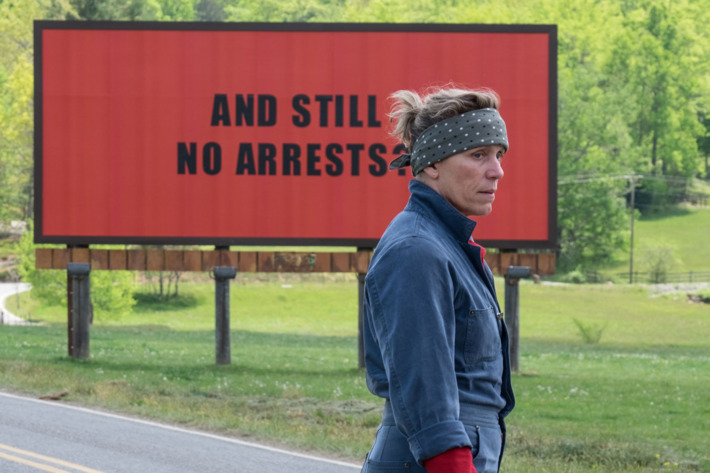The phrase ‘dark comedy’ recurs in descriptions of the filmography of Martin McDonagh, the London-born but Irish-descended playwright turned film-maker who this week received a Golden Globe for his third feature, Three Billboards Outside Ebbing, Missouri. It’s the kind of loose, generous generic signifier that covers a multitude of structural and tonal sins.
Sin is something McDonagh seems very interested in, populating his films with ugly people hopscotching across ugly situations. Redemption is a tricky prospect, both for the characters and for McDonagh himself, who lumbers Three Billboards with much the same problems that made In Bruges and Seven Psychopaths such struggles to sit through.
Three billboards; three films; three strikes and you’re out.
The original sin in Three Billboards is the rape and murder of teenager Angela Hayes (Kathryn Newton, seen in flashbacks), an unpunished profanity that spurs her grieving, righteous mother Mildred (Frances McDormand) into a public stunt to revive the dormant case. She rents the titular billboard spaces from snakish ad man Red (Get Out’s Caleb Landry Jones), erecting her provocation in hard black font on a dead-red background (is typography an Academy category?).
The messages call out the inaction of beloved sheriff Bill Willoughby (Woody Harrelson), who says ‘goddamn’ a lot and is dealing with his own mortality issues, and so could really do without the fuss. At his right hand is Dixon, a racist, aggressive hick officer, played by Sam Rockwell with the same vacant dopiness from his Psychopaths performance. Most of the town, including Mildred’s son Robbie (Manchester by the Sea’s Lucas Hedges, who can do a good seethe), hate the billboards, but the town’s African-Americans hate the pigs even more. Stereotypes and half-formed personalities draw battle lines.
So, it’s a cartoon. But cartoons can be fun. When Daffy Duck drops a stick of dynamite down Elmer Fudd’s pants, it’s a blast. Frances McDormand is Daffy Duck, and anyone in her way is Fudd. Her gunslinger is an avenging angel, a purse-lipped machine gun of stoic contempt. Other people react to her the way a crab reacts to a tiger shark. She’s dangerous and unpredictable, partly by design, partly through McDonagh’s inconsistency, and she demands attention every time she’s on screen. It’s almost enough to convince you she’s a real character.
When Mildred’s sheer force of will isn’t keeping the drama taut, the film’s issues are harder to mask. It feels bitty and haphazard, and the pacing drags, not because it’s especially long, but because there’s no momentum. Something happens, then something else happens. A character acts this way, then a different way, because of convenience, or coincidence.
McDonagh has toned down the brattish homophobia of In Bruges, but the fake-edginess lingers in the rambling, showy speeches and weird political incorrectness. An African-American sheriff (The Wire’s Clarke Peters) enters the police station, shows no papers, and calls the room ‘cracker motherfuckers’. The line makes no sense in the situation, but it’s there because it sounds kind of cool and funny.
McDonagh’s plots are tough and masculine, dealing with vengeance, justice, guilt, murder, suicide and culpability. But plot and story are different things. Story requires manifestation of theme through relatable characters, and, above all, a sense of something being at stake. Three Billboards ends with two characters setting off together on a vigilante mission, scrambling earlier protestations about forgiveness and peace. As they drive off, one wonders aloud; should they go through with it? ‘We’ll decide on the way’ shrugs the other.
For all of the cruel and slapstick carnage he fills his films with, McDonagh appears to have no point of view on violence in the first place. He just…decides on the way. Conor Smyth




